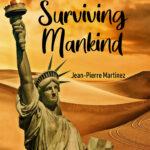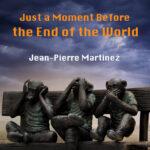Jean-Pierre Martinez explores contemporary social and environmental themes in his plays, always with a humorous touch. From his earliest writings, he addresses the impact of human activity on the environment and denounces industrial farming. Starting in 2019, ecology becomes the central theme in some of his plays, developing a critical discourse that fits within the literary genre of Climate Fiction (Cli-Fi).
I. Ecology as a Central Theme
Ecology becomes a subject of tragicomedy when humanity’s madness threatens its very existence as a species. Some plays present dystopias where people must confront the disasters caused primarily by climate change.
A couple of astronauts are on their way to Mars with the intention of establishing a colony and laying the foundations for a new, more humanistic humanity. Following a mysterious accident, this space journey turns into a voyage through time. Between a dystopian future and a past carrying the seeds of impending disasters, it may be tempting to want to rewrite history… and perhaps even the Bible!
On a Planet Earth ravaged by climate change and rendered uninhabitable, mankind is living out its final hours. Two men and two women are set to take off in a spaceship for an unknown planet that might be their only chance for survival. The mission of these four « chosen ones » is to give humanity one last chance to save itself and carry on its evolution. But does mankind deserve a second chance if self-destructive madness caused its extermination? The passengers cannot agree…
Three people who do not know each other are summoned to participate in a jury. At least, that's what they were told. But the place where they have been gathered is not a courtroom. They learn that they are there to decide together how to manage the consequences of an inevitable catastrophe that will strike the world in the very near future. Opinions diverge, and numerous twists and turns keep the debate alive. Throughout this immersive performance, the audience will also be called upon to express their opinions to guide them in their choices, so that they can make the best possible decision to face the worst imaginable situation.
II. Different dimensions of ecology throughout the plays
1.Impact of human activity on the environment
Numerous sketches depict the consequences of environmental disasters in a more or less distant future.
Waste
Excerpt from the sketch Green Sky from the collection Of All Colors
Two – Are we sure Earthlings still exist?
One – The signal is coming from quite far away… A few thousand light-years… Last we heard, they had already turned their planet into a garbage dump. Not to mention they spent their time killing each other.
Two – Not sure idiots like that could have survived another thousand years.
Pollution
Excerpt from the sketch Atmosphere (from the collection Alban and Eve)
Alban – We can breathe a bit better today, right?
Eve – Yes. I almost feel like going out without a gas mask.
Excerpt from the sketch Black and White (from the collection Of All Colors)
Two – Back in my great-grandmother’s day, it was the movies that were in black and white and 2D. Life had depth and it was in color. Now, it’s the other way around.
One – Really? I can hardly imagine that… So back then, the whole world was in color? But what happened?
Two – It happened little by little. No one saw it coming. They started by making us pay for the water we drink. Then they made us pay for the air we breathe. Now, we even have to go to the movies to see life in color.
Excerpt from the sketch Meter (from the collection No Entry, No Limits)
Two – You need to stop exercising, Mr. Dumortier… It might be good for your health, but it’s not good for your wallet…
One – Especially since the price of oxygen went up again this month…
Two – You don’t have a leak, do you?
One – I don’t think so…
He writes down the number in a notebook.
Two – You might want to lower the ceiling a bit more… There would be less waste, believe me…
One – It’s just that with my back…
Two – Lowering the ceiling by thirty centimeters cuts oxygen consumption by ten percent… Didn’t you see our latest public awareness campaign on TV?
Industrial animal exploitation
The denunciation of industrial animal exploitation is mentioned in numerous sketches. Humor arises from potential conflicts within couples regarding whether or not to eat meat.
In the sketch Sensitive Heart from the collection Open Hearts:
Her – Do you eat meat?
Him – Uh… yes. Well, no.
Her – But you eat ham…
Him – Yes, but… Ham isn’t really meat, is it?
Her – Have you seen the latest L214 investigation on pig farming in cages?
Him – No.
Her – I think if you had seen it, you wouldn’t eat ham anymore…
Him – I’m sorry, I… I didn’t know…
Her – That’s what the Germans said after the war about the camps.
Him – What did they say?
Her – I didn’t know…
Him – Right… so… you’re vegetarian.
Her – Vegan.
See also:
It’s Not a Drama from the collection Melodramatic Mishmash
Graze from the collection No Entry, No Limits
Meat from the collection Alban and Eve
The Sacred Fire from the collection Passing Time Chronicles
Small Business from the collection Him and Her
The theme is also addressed in Strip Poker and Surviving Mankind (A nod to the French nonprofit animal defense organization, L214 with the mention of the planet Y214).
2. The Solastagia
Excerpt from the sketch The Collapsed from the collection Funny Stories
Woman – Hello, how are you?
Man – Do you really want to know how I am?
Woman – Yes, of course… Well, no, I was just being polite, but… Why, what’s wrong?
Man – What’s wrong? The game is over, dear madam. Nothing is going well anymore. The global collapse process has already begun.
Woman – Collapse? Collapse of what?
Man – Our own collapse! The collapse of our civilization! If you can even call it a civilization…
Woman – Oh, right… Our civilization… You scared me. I thought you were talking about your roof. Or mine.
Man – But that’s exactly it! The house is burning, and the roof is about to fall on our heads.
Woman – Okay… But besides that, are you doing well?
Man – You think everything is fine, do you?
Woman – I still have my allergy problems, but well… It’s not the end of the world.
Man – Well, yes, it is. It’s the end of the world!
Woman – You have allergy problems too?
Man – Yes. I’m allergic to this society, which is digging its own grave with its own teeth, devouring day after day all the planet’s resources…
3. The end of humanity: the extinction of the human species
Excerpt from the sketch: It’s Not the End of the World (from the collection Lost Time Chronicles)
Alban – Two hours. For a life review, that’s a bit short, isn’t it?
Eve – For a personal inventory before giving up your lease, maybe not. But to assess the whole of humanity…
Alban – What would you say? Overall positive?
Eve – It’s not just about weighing the positive against the negative. You also have to consider everything in between. Dark matter. Insignificance. Absurdity.
Alban – If we could still doubt the absurdity of this world, the insignificance of its end should finish discouraging those who still believed in God.
Eve – They’d talk to you about apocalypse and divine punishment…
Alban – Until now, my philosophy was more like after me, the flood. I didn’t think the flood would come in my lifetime…
Excerpt from the sketch End of the Line (from the collection Alban and Eve)
Alban – This is it.
Eve – We’re the last ones.
Alban – It’s the last evening of the last day.
Eve – How much time do we have left?
Alban – One more hour of electricity.
Eve – Then the air conditioning will stop.
Alban – We’re going to die from the heat.
Eve – We’re already dying from the heat, aren’t we?
Alban – But this time, we’ll really die…
Eve – I’m thirsty. Is there anything left to drink?
Alban – There’s one apple left.
She takes the apple and hands it to him.
Eve – Shall we share?
Alban – I’ll indulge…
She cuts the apple in half, and they each eat their half in silence.
Eve – Our last meal. Just the two of us.
Alban – The last apple, from the last apple tree. Before the garden is swallowed by the flames of hell.
Excerpt from the sketch Back to the Future (from the collection Memory Lapses)
Her – Have you ever, when considering all the horrors mankind is capable of, asked yourself this simple question: When did it all start to go wrong?
Him – Well, yes… And in your opinion, when?
Her – The answer is unfortunately obvious: when the ape became Homo sapiens.
Him – Oh, right…
Her – Or by your standards, since you’re Catholic, when God created Man.
Him – You think He made a mistake?
Her – You just have to look at today’s results to be convinced. It was a real ticking time bomb.
Him – Right… So, what exactly do you suggest?
Her – At first, we thought about creating a superhuman. But that’s already been tried in the past, with the unfortunate consequences we know. With man, we’re heading for disaster. With a superhuman, we’re sprinting towards it.
Him – Oh, right…
Her – So the solution isn’t in moving forward, but rather in going backward.
Him – Backward?
Her – The world’s greatest scientists, along with top experts in the human sciences, including the most eminent philosophers, gathered secretly a few months ago under the UN’s aegis. Their conclusion is clear: the only real long-term solution to save the Earth is to revert mankind back to the ape stage.
Humour as the ultimate weapon
Avoiding any moralizing tone, Jean-Pierre Martinez addresses the environmental challenges our planet faces through his plays and sketches, raising awareness among the audience and encouraging them to reflect on their own contradictions or the absurdity of certain attitudes in response to these challenges.



